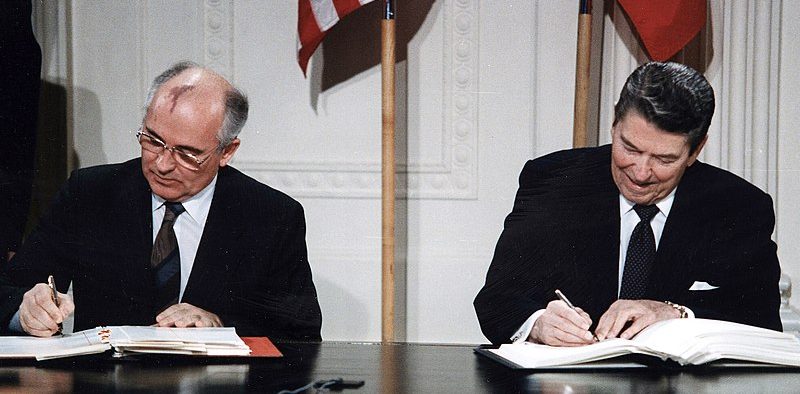US Formally Quits the Cold War-Era Nuclear Deal, What’s Next?

“We’ve been speaking with Russia about the pact for nuclear. China is very excited about it too.” – President Trump
The U.S. officially withdrew from the Cold War-era strategic nuclear deal signed in 1987, known as the Intermediate-Range Nuclear Forces (INF), repeatedly accusing Russia of breaching the agreement despite Moscow’s denial.
The agreement, signed by then-U.S. President Ronald Reagan and Soviet leader Mikhail Gorbachev, banned both countries from developing, possessing, deploying and testing ground-launched and nuclear medium-range ballistic missiles with ranges of approximately 300 to 3,000 miles.
During the ASEAN security forum in Bangkok, Thailand, U.S. Secretary of State Mike Pompeo announced Washington’s formal exit from the arms control pact. He also put the blame on Russia a few minutes after Russia declared the INF had died, as CNN reported.
“Russia is solely responsible for the treaty’s demise,” Pompeo said, adding that Moscow had failed to fully comply with the treaty by utilizing the land-based nuclear-capable 9M729 missile, or the SSC-8, as NATO (North Atlantic Treaty Organization) called it.
In the Pentagon’s immediate release on August 2, U.S. Secretary of Defense Mark Esper included NATO Secretary-General Jens Stoltenberg’s statement that the U.S. has complied with the collapsed deal.
“The facts are clear. The Russian Federation is producing and fielding an offensive capability that was prohibited by the INF Treaty. Russia’s material breach erodes the foundation of effective arms control and the security of the United States and our allies and partners. As stated by NATO Secretary-General Jens Stoltenberg today, NATO’s position is united and clear: Russia is in violation of the INF Treaty. The United States is not,” the release stated.
In February, Washington threatened to quit the INF unless Moscow reversed its 9M729 program introduced the previous month. Russia argued that the new missile did not violate the INF as its maximum range is the limit in the accord.
“Russia was in compliance and continues to be in strict compliance with the stipulations of the treaty and does not allow any violations,” Mikhail Matveevsky, Russia’s head of artillery and missile troops, told Euractiv.
Russia Snubbed Washington’s Accusation
Russia denied violating the INF deal, slamming Washington for exaggerating claims to justify the development of new weapons.
Moscow cited Washington’s withdrawal from the Anti-Ballistic Missile Treaty under George W. Bush in 2002. The now-defunct pact prevented Washington and Moscow from stationing nationwide defenses against strategic ballistic missiles.
In 2014, then-U.S. President Barack Obama slammed Russia for breaching the INF accord following Moscow’s ground-launched cruise missile. Obama decided not to pull out due to pressure from Washington’s European allies, as BBC reported.
The Uncertain Future of a New Nuclear Accord
Washington’s formal exit from the INF has raised concern over the possible arms race, even though NATO stated it does not expect a new arms race or a decision to deploy a nuclear warhead in Europe.
The future of another nuclear control pact known as START (Strategic Arms Reduction Treaty), signed in 2010, is still unclear, as U.S. National Security Advisor John Bolton declared last June that the White House would not extend the treaty after the expiry date in 2021.
START aims to restrict the number of inter-continental warheads Russia and the U.S. deployed to no more than 700, including those launched from vessels.
President Donald Trump expressed his interest in including China in a new nuclear pact along with Russia in the G-20 meeting in Osaka at the end of June. The upcoming treaty will consist of all types of weapons since the INF did not bar missiles launched from the air and the sea.
“We’ve been speaking with Russia about the pact for nuclear. China is very excited about it too,” Trump spoke to reporters outside the White House as RT wrote.
Russia welcomes the idea. However, China seems to be reluctant to be included in the new deal, claiming that Beijing is not at the same level as Russia and the U.S., in terms of nuclear warheads.
“The United States is saying China should be a party in this disarmament agreement, but I think everybody knows that China is not at the same level with the United States and the Russian Federation,” said China’s new ambassador to the United Nations, Zhang Jun, as Globalnews wrote.
Despite the decrease in the numbers of warheads, the U.S. and Russia still control the world’s total number of warheads (around 6,000 each), while China only has about 280 in total, the SIPRI data showed.
Either China or Russia may cast doubt over making a new agreement with Washington following the latter’s withdrawal from the Iran deal and the INF.












Optimists about the human condition seem blinded by the increasing dazzle of technological advancements. They are wonderful indeed. But we are still the same savage beings who rampaged for blood and booty with the likes of Alexander and Timur. Then we wielded swords, now we wield warheads, which is a tremendous technological “advancement”.